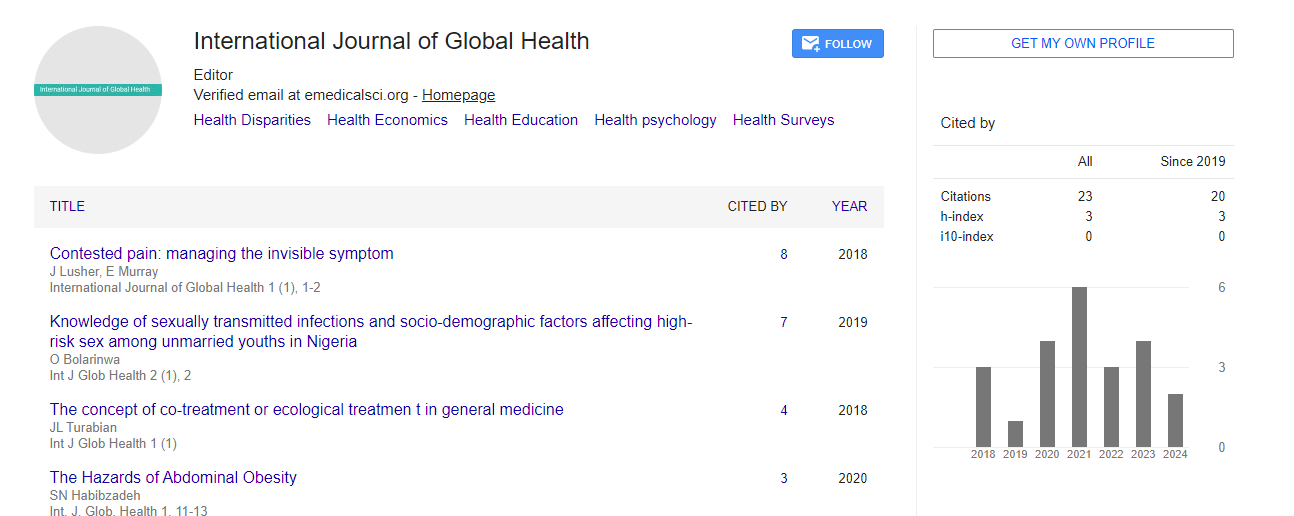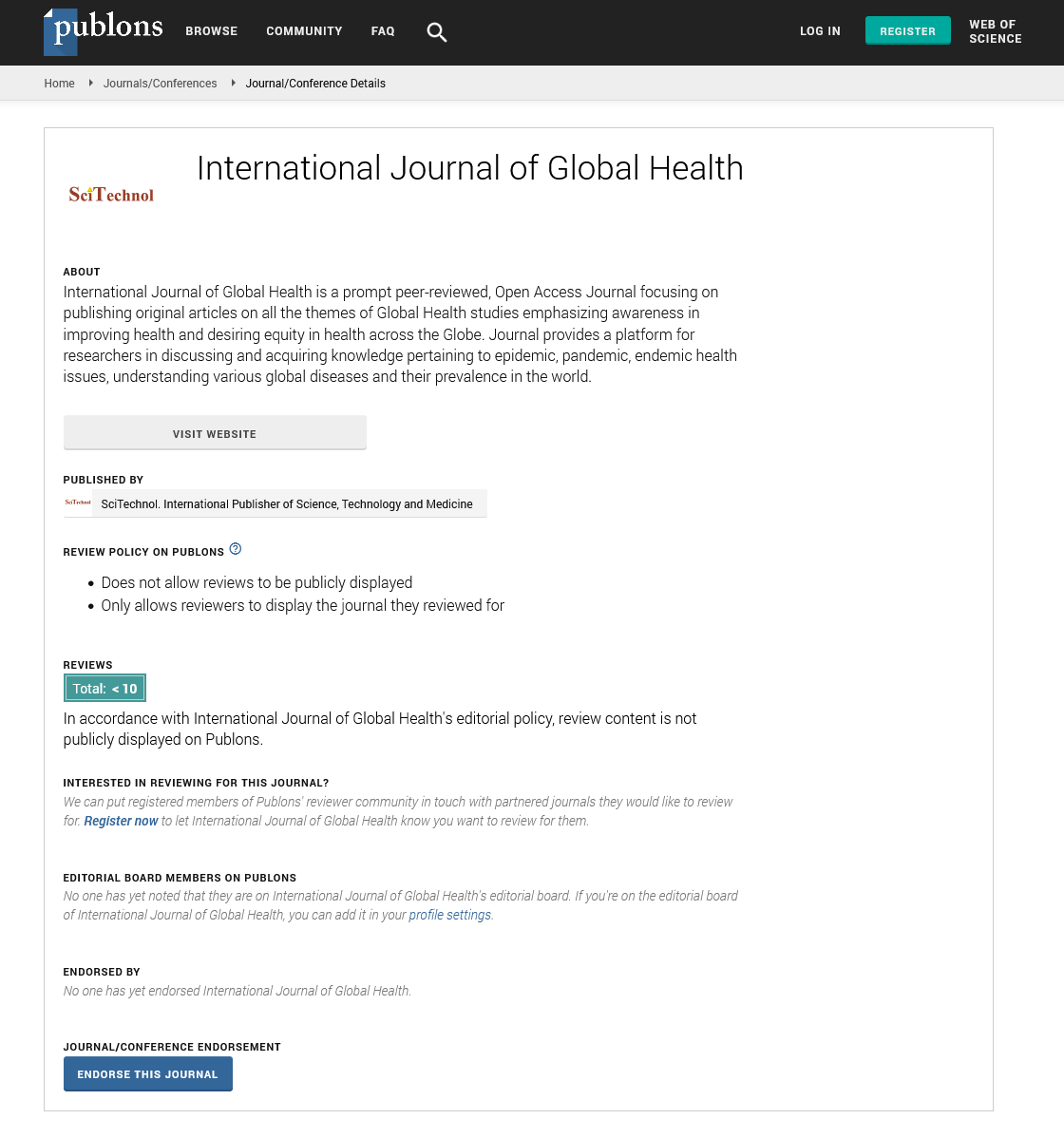Opinion Article, Int J Glob Health Vol: 6 Issue: 1
Humanitarian Crisis: Understanding the Causes and Consequences
Charmaine White*
Department of Health care, University of Victoria, Victoria, Canada
*Corresponding Author: Charmaine White
Department of Health care
University of Victoria, Victoria, Canada
Email: charamainewhite@gmail.com
Received date: 21 February, 2023, Manuscript No. IJGH-23-96058;
Editor assigned date: 23 February, 2023, PreQC No. IJGH-23-96058 (PQ);
Reviewed date: 09 March, 2023, QC No. IJGH-23-96058;
Revised date: 16 March, 2023, Manuscript No. IJGH-23-96058 (R);
Published date: 23 March, 2023, DOI: 10.4172/Ijgh.1000174
Citation: White C (2023) Humanitarian Crisis: Understanding the Causes and Consequences. Int J Glob Health 6:1.
Description
Humanitarian crises, characterized by widespread suffering and displacement of vulnerable populations, are complex emergencies that require urgent attention and response. These crises can be triggered by a variety of factors, including armed conflicts, natural disasters, political instability, economic collapse, or a combination of these factors. The consequences of humanitarian crises are far-reaching, affecting the physical, mental, and emotional well-being of affected populations, and often resulting in long-term social, economic, and political repercussions. In this article, we will explore the causes, consequences, and potential solutions to humanitarian crises, aiming to shed light on the critical issues faced by those affected by these crises.
Causes of humanitarian crises
Humanitarian crises can have multiple causes, and they are often intertwined. Some of the primary causes include:
Armed conflicts: Armed conflicts, both internal and external, are major drivers of humanitarian crises. Conflicts can result in widespread violence, displacement of civilians, destruction of infrastructure, disruption of essential services, and loss of lives and livelihoods. Conflicts can also exacerbate pre-existing social, ethnic, and political tensions, leading to further instability and suffering.
Natural disasters: Natural disasters, such as earthquakes, hurricanes, floods, droughts, and wildfires, can cause massive destruction, displacing communities and disrupting basic services like water, sanitation, healthcare, and food supply. Climate change has also been linked to an increase in the frequency and intensity of natural disasters, exacerbating their impact on vulnerable populations.
Political instability: Political instability, including governance failures, corruption, human rights abuses, and lack of access to justice, can create a fertile ground for humanitarian crises. Political instability can lead to widespread social unrest, displacement of populations, and breakdown of essential services, resulting in dire humanitarian situations.
Economic collapse: Economic collapse, such as hyperinflation, unemployment, and poverty, can also trigger humanitarian crises. Economic instability can lead to food and water scarcity, inadequate healthcare, and limited access to education and livelihood opportunities, pushing vulnerable populations to the brink of survival.
Consequences of humanitarian crises
The consequences of humanitarian crises are far-reaching and multifaceted. They can impact various aspects of individuals, communities, and societies, including:
Displacement of populations: Humanitarian crises often result in the forced displacement of populations, including refugees, Internally Displaced Persons (IDPs), and migrants. Displaced populations face numerous challenges, including lack of access to shelter, clean water, food, healthcare, education, and protection, exposing them to increased risks of disease, violence, and exploitation.
Loss of lives and livelihoods: Humanitarian crises can result in the loss of lives, homes, and livelihoods. Conflict-related violence, natural disasters, and displacement can lead to injuries, deaths, destruction of infrastructure, and disruption of economic activities, further exacerbating poverty, inequality, and vulnerability.
Health and mental health impacts: Humanitarian crises can have severe health impacts, including outbreaks of diseases, malnutrition, mental health disorders, and inadequate access to healthcare. Disrupted healthcare systems, lack of clean water and sanitation, and overcrowded living conditions in camps or temporary shelters can increase the risk of infectious diseases, mental health disorders, and other health challenges.
Social and economic repercussions: Humanitarian crises can have long-term social and economic repercussions. Displacement, loss of education opportunities, disruption of economic activities, and breakdown of social structures can result in long-term social and economic instability, hindering the recovery and development of affected communities and societies.
 Spanish
Spanish  Chinese
Chinese  Russian
Russian  German
German  French
French  Japanese
Japanese  Portuguese
Portuguese  Hindi
Hindi 
